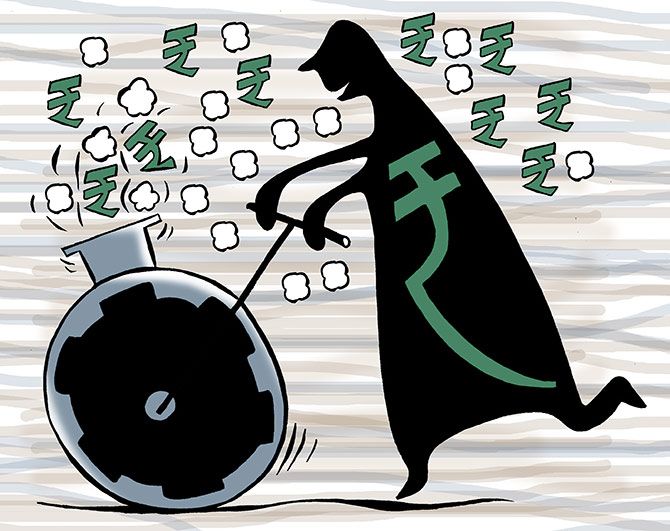Bankers seem to be pleased with the government for keeping its promise of not interfering in operational matters, but are apprehensive about the intense scrutiny of their functioning.
Illustration: Uttam Ghosh/Rediff.com

The government in August 2015 announced ‘Indradhanush’, a seven-pronged plan to reform public sector banks (PSBs).
About three years later, much of the action points remain unachieved.
What the government has shown, though, is the political will to support the Reserve Bank of India-initiated clean-up drive of the balance sheets of banks.
Some big reforms in the shape of the Insolvency and Bankruptcy Code (IBC) have been initiated for this. But the jury is out on whether they would help the domestic banking sector become healthy, say experts.
So far, one of the 12 large accounts referred by the Reserve Bank of India (RBI) in June last year has seen successful resolution.
Tata Steel bought Bhushan Steel for Rs 35,200 crore, for which bankers took a haircut of 37 per cent, lower than many analysts had expected the bankers would have to concede in discount when the proceedings started.
If other accounts meet with such success for the banking system, the IBC and the resultant behavior change of corporate borrowers would be a great legacy of the Modi government, analysts say.
Bankers seem to be pleased with the government for keeping its promise of not interfering in operational matters, but are apprehensive about the intense scrutiny of their functioning.
The recent arrests and questioning of bankers have shaken their confidence, while the RBI’s strict rules on stressed assets could be forcing banks to sell assets at a deep discount.
Some of the assets could have been recovered had more time been given, say bankers.
But the government had promised to put in enough capital, Rs 2.11 trillion, into banks to enable them for a deep cleaning.
On April 1, 2017, State Bank of India merged its associates with itself, joining the league of the top 50 global banks.
Finance Minister Arun Jaitley gave indications of deep reforms by pushing banks towards privatisation, starting with IDBI Bank.
However, in January this year, the banking system was rocked by the Rs 13,000 crore-plus scam at Punjab National Bank.
The government intensified its scrutiny of bankers after that and life has been tough for them at a time when the Lok Sabha elections are due in less than a year.
It is perhaps not an overstatement that Prime Minister Narendra Modi made banks the fulcrum of many of his programmes. From opening an account for each family, to direct benefit transfer, to efforts at wiping out black money through demonetisation, Modi has time and again leaned on banks to further his social and economic agenda.
Bankers didn’t disappoint him, but things have soured of late.
The government had started with a great promise for bankers.
On the basis of the P J Nayak committee report on banking reforms, the government split the post of chairman and managing director in banks.
The government also appointed two outsiders as the head of Bank of Baroda and Canara Bank, two of the largest banks in the country.
The next move was to announce Indradhanush. The plan, arranged alphabetically, involved Appointments, Banks Board Bureau, Capitalisation, De-stressing PSBs, Empowerment, Framework of Accountability, and Governance Reforms.
Bankers were told the government would not interfere in their work, and the Prime Minister assured them there would be no call to them from his office, either.
They say Modi has kept his promise.
Nevertheless, the banking sector could have much more.
“This government brought in a lot of hope, but they have not really been fulfilled,” said a senior banker.
For example, even though there was a promise of empowerment and ownership neutrality, the human resource policies of public sector banks are “still uniform, there is no special recognition or reward for performing bankers, no retention policies, arbitrary transfers and the absurd witch hunt,” the banker said.
Another senior banking sector expert says plans are ready but execution is a problem.
“Rather than showing us the action plan, please point out the one you are going to implement now,” said the person.
Bankers say while the IBC is a great idea, the National Company Law Tribunal (NCLT) is new and largely untested.
And yet more and more cases are being pushed into this institution, leaving a grey area.
To their credit, the judges in NCLTs have expeditiously ruled in stressed assets cases, but those rulings should be debated more.
Despite having a majority in the Lok Sabha and perhaps the political will to do deep reforms, the government could not distance itself from ownership, something that the RBI governor stressed reforming as soon as possible and empowering the central bank more to do effective control over the boards of public sector banks.
At present, despite being the regulator, it cannot pack off bank boards.
Bad debts in the Indian banking sector skyrocketed under this regime.
In the June quarter of 2014, the gross non-performing assets (NPAs) of the listed banking entities were Rs 2.43 trillion.
Those swelled to Rs 8.82 trillion by the end of the December quarter, led by public sector banks.
The gross NPA of PSBs were at Rs 2.19 trillion in June 2014, which rose to Rs 7.83 trillion by the end of December 2017.
What is disturbing though is that the profitability of banks plunged in this period.
The banking sector as a whole had net losses of Rs 7,255 crore in December 2017, against Rs 20,174 crore in profit in the quarter when Modi took over as prime minister.
Public sector banks accounted for a combined loss of Rs 18,025 crore, against Rs 11,570 crore in profit in 2014.
The market capitalisation of PSBs plunged to Rs 4.29 trillion on May 21, 2018, against Rs 7.26 trillion on May 26, 2014.
In contrast, the market cap of private banks more than doubled from Rs 6.5 trillion to Rs 14.2 trillion in that same period.











